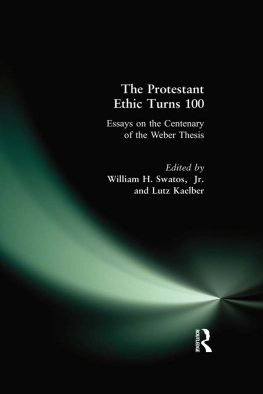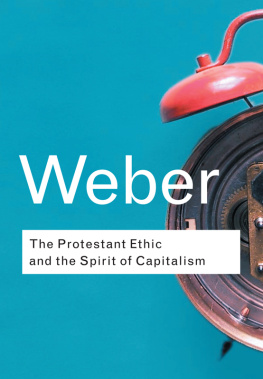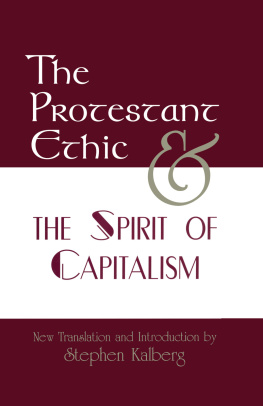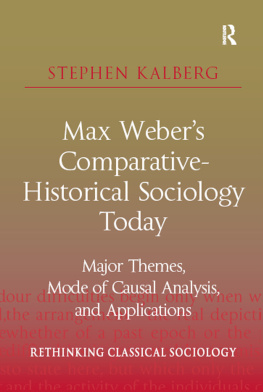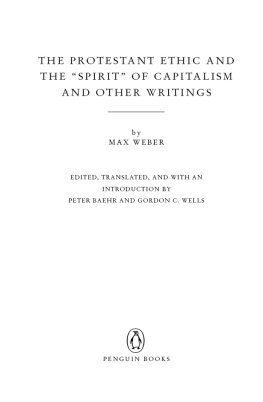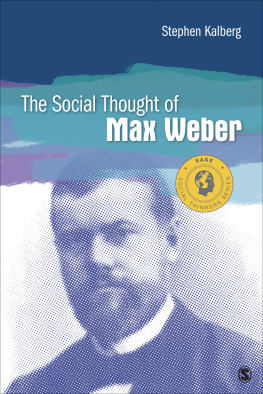The Protestant Ethic Turns 100
Great Barrington Books
Bringing the old and new together
in the spirit of W. E. B. Du Bois
An imprint edited by Charles Lemert
Titles Available
Keeping Good Time: Reflections on Knowledge, Power, and People
by Avery F. Gordon (2004)
Going Down for Air: A Memoir in Search of a Subject
by Derek Sayer (2004)
The Souls of Black Folk 100th Anniversary Edition
by W. E. B. Du Bois, with commentaries
by Manning Marable, Charles Lemert, and Cheryl Townsend Gilkes (2004)
Sociology After the Crisis
by Charles Lemert (2004)
The Protestant Ethic Turns 100: Essays on the Centenary of the Weber Thesis
edited by William H. Swatos, Jr., and Lutz Kaelber (2005)
Seeing Sociologically: The Routine Grounds of Social Action by Harold Garfinkel, edited and introduced
by Ann Rawls (2005)
The Protestant Ethic
Turns 100
Essays on the Centenary of the
Weber Thesis
edited by
William H. Swatos, Jr.
and Lutz Kaelber

First published 2005 by Paradigm Publishers
Published 2016 by Routledge
2 Park Square, Milton Park, Abingdon, Oxon OX14 4RN
711 Third Avenue, New York, NY 10017, USA
Routledge is an imprint of the Taylor & Francis Group, an informa business
Copyright 2005, Taylor & Francis.
All rights reserved. No part of this book may be reprinted or reproduced or utilised in any form or
by any electronic, mechanical, or other means, now known or hereafter invented, including photocopying and recording, or in any information storage or retrieval system, without permission
in writing from the publishers.
Notice:
Product or corporate names may be trademarks or registered trademarks, and are used only for identification and explanation without intent to infringe.
Library of Congress Cataloging-in-Publication Data
The Protestant ethic turns 100 : essays on the centenary of the Weber thesis edited by William H. Swatos, Jr. and Lutz Kaelber.
p. cm.
Includes bibliographical references and index.
ISBN 1-59451-098-9 (alk. paper)
1. Weber, Max, 18641920. Protestantische Ethik und der Geist des
Kapitalismus. 2. CapitalismReligious aspectsProtestant churches. 3. Religion and sociology. 4. Christian ethics. 5. Calvinism. 6. Protestant work ethic.
I. Title: Protestant ethic turns one hundred. II. Swatos, William H.
III. Kaelber, Lutz.
BR1 15.E3P733 2005
306.6dc22
2005004917
Designed and Typeset by Straight Creek Bookmakers.
ISBN 13: 978-1-59451-098-4 (hbk)
ISBN 13: 978-1-59451-099-1 (pbk)
In Memoriam
Wolfgang Mommsen
19302004
Contents
Charles Lemert
Lutz Kaelber
Hartmut Lehmann
Martin Riesebrodt
Donald A. Nielsen
Lawrence A. Scaff
William H. Swatos, Jr., and Peter Kivisto
Lutz Kaelber
Philip S. Gorski
Stephen Kalberg
Charles Lemert
O NE OF THE SELDOM-MENTIONED COINCIDENCES in the early years of the twentieth century is that 1905 offered up at least two significant revolutions in the way moderns thought about their worldsEinsteins in physics, and Webers in sociology. It may not be incidental that both set forth their ideas in a series of imperfectly linked papers. In 1905, Einstein published the three papers that laid the foundation of a theory of the physical universe as, if not exactly foundationless, an indefinite space in time without a stable physical structureas, in effect, a space vulnerable to times warping speed. Before 2005 ends the centenary of Einsteins annus mirabilis, nearly everyone will have been informed of the titles and topics of his works of genius. Though we sociologists will give it a go, it is improbable that the world will attend as well to Webers genius. It is sociologys fate that its revolutions are always less conspicuously publicvery often not even appreciated by sociologists themselves.
Webers Protestant Ethic and the Spirit of Capitalism, also a weak collection of strong papers written when Einstein was working on his, has had much the sameif not exactly the sameeffect on the human sciences as Einsteins had on modern physics. Still, given the difference of method and scientific self-confidence it would be hard to imagine a physicist who could not recite the elements of the general and specific theories of relativity, and it would equally as hard to imagine more than a few sociologists who would agree upon the nature, much less the import, of Webers idea of the space of the modern world. More curious still are the underlying sympathies to be found between Einsteins theory of the indefinite relations between space and time and Webers original, if baffling, theory that the space of the modern world of capitalism, having become a tremendous cosmos, had also cast the traditional sources of human culture and subjective meaning out of the times in which they had been established. Weber, like Einstein, thought of modern society as founded without foundations in a stable structure.
Webers strong idea of the nature of modern societies was based on a then unspoken view of complex societies as dispersions in social space. Before Weber, and since, sociology has resisted the idea that social spaces are always and necessarily in unstable relation to their times. We realize somewhat better now that the irony of any sociology of large structures is that the structures, as they are portrayed in their empirical descriptions, are never fully captured by the data, which in either case are data gathered from some previousoften far previousera when the structures said to be at work in the now are in fact locked in the time of a long ago then. If it is the structure of the modern family we seek to describe, the demographic data entailed are at least a few years old, usually a good decade. If it is the structure of cultural attitudes toward any subject whatever the data are regressed in more ways than the apparent oneusually back well into the time of their collection, certainly more than a mere decade. And so on. Nonetheless we do our work on the structures we think of as if they were in a here without any sufficient reason to know that they are.
This of course is the way of the sociological worlds of which Weber wrote, never more lucidly and brilliantly than in the great collection of papers of 19041905. The Protestant Ethic meant to show, among other things, that historical materialism, its claims notwithstanding, was in his day actually quite ahistoricalor, better put, quite rigidly linear in its attitude toward historical progress. In setting himself up as less an opponent of historical materialism than a friendly amender of its unworkably crude theory of the origins of capitalism, Weber was being, one suspects, a bit disingenuous. Yet, the way he staked his claim against Marx and Marxism is at the heart of his unrecognized revolution in social thought.
By tracing the lineage of the spirit of capitalism back to Calvinisms certitudo salutis doctrine, Weber either hit upon an irony in the facts or was playing with them for rhetorical effect. Economic rationality in this world arose from an other-worldly calculation. Either way, the irony lay in the attempt to counter the then prominent materialism with what today we would call a culturalist argument. What lends specific gravity to the derivation of modern capitalism from a late-traditional religion is the larger theoretical method for describing modern social spaces. Unlike Marx, who viewed the modern as discontinuous with the village life of rural idiocy, and Durkheim, who thought the modern was a tragic fall from traditional moral solidity, Weber broke with the method that went back through the political economists to Hobbes of interpreting the more complex social arrangements through the monocular lens of the more elemental ones.

